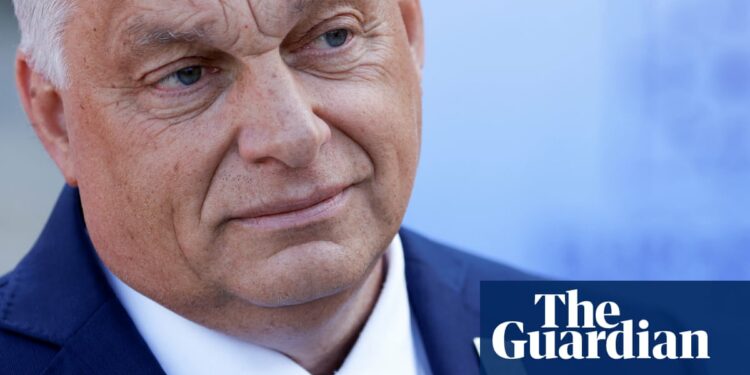Hungary’s government has presided over EU talks on upholding democratic standards across the continent, in a development one prominent MEP described as “outrageous”.
Viktor Orbán’s government has been under an EU sanctions procedure since 2018 for posing a “systemic threat” to democracy and the rule of law.
Around €19bn (£16bn) of EU funds are frozen over concerns about the government’s control over judges, academic freedom and its failure to tackle corruption. It is now being fined €1m a day on top of a €200m penalty by the EU’s highest court for refusing to comply with European law guaranteeing the rights of asylum seekers.
Despite that catalogue of complaints, it fell to Hungary, as holder of the EU’s rotating presidency, to chair a meeting of European affairs ministers in Brussels on Tuesday on the EU’s annual rule of law report. This document assesses the integrity of the separation of powers, anti-corruption measures and freedom of the press across all 27 member states and four EU candidate countries
Published in July, the EU report concluded that the absence of investigations and prosecutions of high-level corruption cases in Hungary remained “a serious concern”, and voiced alarm about the independence of public service media and the “vilification” of civil society groups, among other issues.
Daniel Freund, a German Green MEP and prominent critic of the Orbán government, said allowing Hungary to chair a meeting on the rule of law should never have happened. “That a country that is under an article 7 – a fundamental value sanction – procedure, that has billions of its EU funds frozen for rule of law violations, that has just been fined €200m, plus €1m a day for rule of law violations, is now chairing the debate on the situation of the rule of law is outrageous.”
The EU’s other member states should have stepped in to prevent Hungary from chairing the meeting, he said.
Asked about the credibility of Hungary chairing EU discussions on the rule of law, Hungary’s EU affairs minister, János Bóka, responded: “Hungary performed its duties as presidency as an honest broker sincerely cooperating with all member states and institutions and I received no other indication from any other member state or institution.”
Didier Reynders, the EU justice commissioner, did not respond directly to the question, but said the commission was at the disposal of EU ministers to organise discussions under the article 7 sanctions procedure “but that depends [on] the agenda of the presidency”.
During the meeting, ministers criticised Hungary for its failure to stress support for Ukraine under its six-month presidency programme.
Sweden’s EU affairs minister, Jessica Rosencrantz, said many countries had intervened in support of Ukraine. “I was very clear in demanding both that Hungary is an honest broker and it was very regrettable that they didn’t stress support for Ukraine in their working programme,” she said.
skip past newsletter promotion
Sign up to This is Europe
The most pressing stories and debates for Europeans – from identity to economics to the environment
Privacy Notice: Newsletters may contain info about charities, online ads, and content funded by outside parties. For more information see our Privacy Policy. We use Google reCaptcha to protect our website and the Google Privacy Policy and Terms of Service apply.
after newsletter promotion
She said it was right for Hungary to chair the debate as it was “very important for the Hungarian presidency to hear all these very clear and strong points” on Ukraine and the rule of law.
Since taking over the EU’s six-month rotating presidency on 1 July, Orbán has infuriated EU leaders with a self-styled peace mission to Moscow, Beijing and Donald Trump’s private residence at Mar-a-Lago. In response, some ministers have boycotted informal EU meetings in Hungary, but the EU’s usual calendar in Brussels has mostly continued as usual.
The European Commission said last week it would deduct the €200m unpaid court fine from Hungary’s forthcoming EU payments and that it had issued a request for payment of the daily rolling fines worth €93m to Budapest.
At the meeting, Sweden and Finland said EU funds should be more tightly linked to respect for the rule of law. Rosencrantz and her Finnish counterpart, Joakim Strand, said that the commission “should continue to make full use” of an EU regulation that tied EU funds to compliance with respecting the rule of law and tackling corruption. “Our taxpayers need to trust that the EU’s common funds are used appropriately and responsibly,” they wrote in a joint letter to the commission.
Source link : https://www.theguardian.com/world/2024/sep/24/outrage-as-hungary-presides-over-eu-meeting-on-democratic-standards
Author :
Publish date : 2024-09-24 07:00:00
Copyright for syndicated content belongs to the linked Source.


